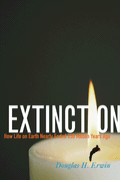Author's Evening: Douglas H. Erwin: Difference between revisions
From Santa Fe Institute Events Wiki
No edit summary |
No edit summary |
||
| (7 intermediate revisions by the same user not shown) | |||
| Line 8: | Line 8: | ||
|} | |} | ||
*'''[http://www.pupress.princeton.edu/titles/8011.html | [[Image:Extinction_copy.jpg|left]] | ||
*'''[http://www.pupress.princeton.edu/titles/8011.html Extinction: How Life on Earth Nearly Ended 250 Million Years Ago,] [http://www.nmnh.si.edu/paleo/curator_cvs/erwin.html Douglas H. Erwin], Smithsonian Institution and Santa Fe Institute: | |||
Some 250 million years ago, the earth suffered the greatest biological crisis in its history. Around 95% of all living species died out--a global catastrophe far greater than the dinosaurs' demise 65 million | Some 250 million years ago, the earth suffered the greatest biological crisis in its history. Around 95% of all living species died out--a global catastrophe far greater than the dinosaurs' demise 65 million | ||
years ago.. Some blame huge volcanic eruptions that covered an area as large as the continental United States; others argue for sudden changes in ocean levels and chemistry, including burps of methane gas; and still others cite the impact of an extraterrestrial object, similar to what caused the dinosaurs' extinction. Extinction is a paleontological mystery story. Here, the world's foremost authority on the subject provides a fascinating overview of the evidence for and against a whole host of hypotheses concerning this cataclysmic event that unfolded at the end of the Permian. After setting the scene, Erwin introduces the suite of possible perpetrators and the types of evidence paleontologists seek. He then unveils the actual evidence--moving from China, where much of the best evidence is found; to a look at extinction in the oceans; to the extraordinary fossil animals of the Karoo Desert of South Africa. Erwin reviews the evidence for each of the hypotheses before presenting his own view of what happened. Although full recovery took tens of millions of years, this most massive of mass extinctions was a powerful creative force, setting the stage for the development of the world as we know it today. | years ago.. Some blame huge volcanic eruptions that covered an area as large as the continental United States; others argue for sudden changes in ocean levels and chemistry, including burps of methane gas; and still others cite the impact of an extraterrestrial object, similar to what caused the dinosaurs' extinction. Extinction is a paleontological mystery story. Here, the world's foremost authority on the subject provides a fascinating overview of the evidence for and against a whole host of hypotheses concerning this cataclysmic event that unfolded at the end of the Permian. After setting the scene, Erwin introduces the suite of possible perpetrators and the types of evidence paleontologists seek. He then unveils the actual evidence--moving from China, where much of the best evidence is found; to a look at extinction in the oceans; to the extraordinary fossil animals of the Karoo Desert of South Africa. Erwin reviews the evidence for each of the hypotheses before presenting his own view of what happened. Although full recovery took tens of millions of years, this most massive of mass extinctions was a powerful creative force, setting the stage for the development of the world as we know it today. | ||
Latest revision as of 22:40, 15 September 2006
| Workshop Navigation |

- Extinction: How Life on Earth Nearly Ended 250 Million Years Ago, Douglas H. Erwin, Smithsonian Institution and Santa Fe Institute:
Some 250 million years ago, the earth suffered the greatest biological crisis in its history. Around 95% of all living species died out--a global catastrophe far greater than the dinosaurs' demise 65 million years ago.. Some blame huge volcanic eruptions that covered an area as large as the continental United States; others argue for sudden changes in ocean levels and chemistry, including burps of methane gas; and still others cite the impact of an extraterrestrial object, similar to what caused the dinosaurs' extinction. Extinction is a paleontological mystery story. Here, the world's foremost authority on the subject provides a fascinating overview of the evidence for and against a whole host of hypotheses concerning this cataclysmic event that unfolded at the end of the Permian. After setting the scene, Erwin introduces the suite of possible perpetrators and the types of evidence paleontologists seek. He then unveils the actual evidence--moving from China, where much of the best evidence is found; to a look at extinction in the oceans; to the extraordinary fossil animals of the Karoo Desert of South Africa. Erwin reviews the evidence for each of the hypotheses before presenting his own view of what happened. Although full recovery took tens of millions of years, this most massive of mass extinctions was a powerful creative force, setting the stage for the development of the world as we know it today.
